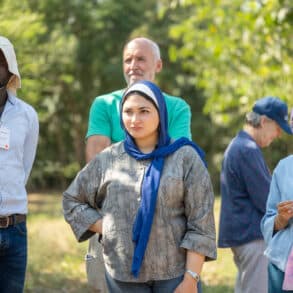The Western allies’ war against the Taliban in Afghanistan has been going on for 20 years. Not only has it resulted in a humanitarian disaster, but the ‹War on Terror› is a war of mindsets. Different cultural developments clash. Democracy and enlightenment cannot be applied imperialistically. They emerge from a process. Looking back illustrates the diversity of cultures and raises the question, in terms of Spiritual Science, of how aggression can be healed today.
We were stunned to see it in the media: after the withdrawal of US and allied troops from Afghanistan, the country was quickly conquered by the Taliban, and the capital Kabul fell into their hands in a flash. The government which was supported by the West dissolved. The Afghan army, trained and equipped by the West, surrendered without a fight. We received shocking images of the tumultuous events at Kabul airport. The world is surprised by the triumphant and rapid seizure. Was it indeed so surprising? Be that as it may: the question in regard to the bigger context arises. What is going on here?
It’s the Tribes, Stupid
Some time ago I came across a thesis from 2009 written by Steven Pressfield, an American historian and novelist. According to him, the key to understanding what is happening in Afghanistan is not Islam but tribalism, tribal culture. Alexander the Great had already failed due to this. Islam did not exist at that time. «It’s the tribes, stupid»1 the title of Steven Pressfield’s five short videos – in reference to Bill Clinton’s slogan: «It’s the economy, stupid.» Tribal warriors’ mental characteristics (‹mindset›) – warrior honour, rule by warlords, subordination of women, changing alliances, lack of national sentiment – can, according to Pressfield, only be effectively countered on the basis of a single strategy: Western army leaders with small elite units take on the role of warlords themselves, stay in the country for a long period of time in scattered bases and engage with the local tribal leaders as competing partners. Respected as courageous warriors, they can win over the locals with money and arms contributions for alliances against radical groups. In this way, and in this way alone, terror that is exported to the West can be contained. Developing a nation state (‹nation building›) along the lines of Western democracies, on the other hand, is a hopeless undertaking. Pressfield’s proposed solution is debatable, but his diagnosis makes sense to me.

Tribe – Nation – State
Tribal cultures, with their complex laws and rules of conduct that are not codified in writing, are similar to one another. They also connect with major world religions. These religious principles, though, will be revalued unless the evolved tribal mentalities are overcome. Even though the holy scriptures of major religions do not approve of such customs, the implicit code of honour killings, blood feuds and the like remains.2 Their humane ethos, in which remnants of earlier stages can also be found, is being bent backwards. This also applied in the realm of historical Christianity for a long time, for example in rural southern Europe until the 20th century. Something similar is happening in post-colonial Africa – in Christian and Islamic countries alike.
On closer inspection, these seem to be elementary self-assertion impulses, an early stage of formation of the I, embedded in manageable, kinship-based groupings. Feelings dominate. One acts out of unreflective but collectively driven motivations and motives. Only the emergence of a pervasive sense of national sentiment across tribes creates the basis for statehood in today’s sense. Impulses of the Sentient Soul grow into forms of the Consciousness Soul. One learns to cope with abstract laws. Connected with this, a basic mindset emerges that creates togetherness – beyond regional and tribal ties. A more or less tightly organized state is formed, which ties the monopoly on the use of force to itself. In the process, transitional forms are common, often military regimes like in Egypt. The full process is essentially only largely complete in Western Europe and overseas Anglo-Saxon countries.
Everything is still in the making in Islamic countries. That is why hybrid forms remain in many countries, in which old and new are mixed. Corruption is rampant. A civil society that could assert its voice is not emerging. In some places, statehood is almost completely collapsing. We see ‹failing states› in Lebanon and Syria. Palestine’s predicament and unsuccessful struggle for freedom there are not only due to Israel’s unwillingness to allow formation of a viable state, but not least to the constitutive conditions of Palestinian society itself.
On closer inspection, they seem to be elementary self-assertion impulses.
During a conversation with an acquaintance from southern Lebanon, I experienced how much the people in this region, which is far more modern than the Hindu Kush, still have this ‹mindset›. As a German citizen, he votes for the SPD. In Lebanon, he sees the militant, massively armed Shiite Islamist Hezbollah as a legitimate representation of his specific ethnic group. He once asked me what I thought of Israeli Prime Minister Benjamin Netanyahu. I made no secret of my lack of sympathy for Netanyahu’s policies. Of course he condemned the person as such. He despises a political juggler like Netanyahu, but respects his predecessor, the fighter and soldier Ariel Sharon – who was tough on Lebanon, which my interlocutor had experienced first-hand as a child!
Mind and Spirit
I am like most commentators who reflect on the problem of modern rule of law failing in the Middle East. Immediately a phrase comes to mind: there is a lack of ‹enlightenment› – the Western ‹mindset›. Freedom of speech and press, an individual lifestyle, gender equality, democracy, equality before the law, separation of religion and state – these feel natural to the Western world today. In the Near and Middle East, these results of European enlightenment are finding it difficult to gain traction. Is it Islam that prevents this? It seems to me that any final judgement in this regard is premature. In the heyday of Arab cultural dominance during the Middle Ages, a kind of early enlightenment emerged where intellectual forces assimilated the philosophical heritage of ancient Greece. The original Islam of the Koran and the legislative decrees of the Sharia developed by Muhammad’s successors are seeds of a developing culture of understanding. As a belief, Islam also formed powers of mind, which offers a kind of commonality to larger groupings – beyond tribes and clans. And seeds of the Consciousness Soul? Doesn’t the Koran, Sura 50 say: «God is closer to you than your own Carotid Artery»? «You,» that is the individual, not the mullah, the caliph or even the collective.
In the heyday of Arab cultural dominance during the Middle Ages, a kind of early enlightenment emerged where intellectual forces assimilated the philosophical heritage of ancient Greece.
Cultures influenced by Islam have not yet completely overcome their tribal ties. Nor did nation-states form, but caliphates that loosely held heterogeneous ethnic groups together, as most recently in the Ottoman Empire. After its disintegration, authoritarian regimes with a secular profile and aspirations towards a nation-state along Western lines emerged, first in Turkey, then after the end of colonialism. In the last third of the 20th century, these were then oppressed by fundamentalist religious groups, and in some regions even displaced. Moderate conservative Islamic parties along Christian democratic lines remain the exception. In Turkey, Erdogan’s AKP shifted towards authoritarianism, and the Ennahda party in Tunisia is seemingly being oppressed. The ‹Arab Spring› suffered severe setbacks after 2010. Difficult births! And miscarriages.
Incomplete Enlightenment – From Mars to Mercury
What makes political Islam so attractive? The answer seems clear: secularist regimes in those countries – not democracies, but rather kleptocracies – have indeed brought forth beginnings of national sentiment, which admittedly remains precarious. Social and also economic conditions are largely in a bad state. In this unstable political-social landscape, recourse to Islam actually mobilizes forces of order. At present, however, its egalitarian forces are not sufficiently visible to lay the foundation for its own path to the rule of law and human rights.3 Arab secularism is turning out to be a regulative dead end. Islam offers better cohesion and rules accredited by tradition. Religion as a constitutive element? Well, it was a religious tradition in our country as well that prepared the ground for modernity to develop. Values of enlightened humanity emerged from Christianity but first had to be wrested from authoritarian clerical paternalism and stripped of their theological form of expression before being handed over to the free citizen.
Another question follows: Why has the Western model of enlightenment and the rule of law failed as a model in these countries so far? First of all, because it has grown on different religious-cultural soil. One’s own must be discovered. Then because of tension between the secularised West and tribalistic Islamic societies. Finally, the most important reason is undoubtedly this: the West itself is in an obvious crisis which is posing a serious problem. Its internal contradictions and immature handling thereof undermine the credibility of its social model.
Our political-social situation is also hybrid. It too holds the old within the new. Here, the structures and effects of the Intellectual Soul are interspersed with elements of the Consciousness Soul, but which increasingly proceed without the participation of the I, without the use of free will, and without the possibility of intervention by individual initiative: in the mechanistic-bureaucratic state apparatus, in the flow of money controlled by computers, in the manically whipped-up ideology of progress, in the dominance of reductionist scientific methods, in the power of anonymous corporations and much more. All this is charged with aggressive energies. They are Martian forces, impulses of self-assertion that continue to have an effect on the Intellectual Soul, but which have begun to turn destructively against human beings. Piece by piece, it is made more difficult for both the individual and collective to access healing. Discrepancy between the rhetoric of values and the human rights of the enlightened West and the real effects of Western actions is perceived everywhere.
The West itself is in an obvious crisis which is posing a serious problem. Its internal contradictions and immature handling thereof undermine the credibility of its social model.
I believe it would be important to consider the following: enlightenment in a true sense is not the mere predominance of the mind, but a demand to place it at the service of the individual human being: the decision and courage to use one’s own power of judgement independently.4 This marks the signature of Western characteristics. It is an epochal impact of the Consciousness Soul, but it is incomplete. Only after the Second World War did a majority of westernised people mentally and socially assimilate liberal, enlightened attitudes as a dominant ‹mindset.› How sustainable this is, however, remains to be seen: the disturbingly irrational reactions in the wake of the current pandemic or the shocking images of the Capitol being stormed on the occasion of the new US president’s inauguration raise serious questions.
I am not a fan of exaggerated self-incrimination by the West. But first and foremost, we must try to become aware of our very own, sometimes serious, shortcomings, and fix them. This means overcoming Martian forces towards a Mercurial element of exchange and connection, of healing on a large and small scale, in global action as well as in everyday life. These are growing qualities of the Consciousness Soul.5 They are already there, but they only develop gradually. They cannot yet completely replace the ego-driven tendencies towards self-assertion. Groups and individuals may and must also protect themselves. A ‹democracy able to defend itself› should truly be able to defend itself, whether in confrontation with destructive demagogues on the inside or with aggressors from outside. Dilettantism, miscalculation and inefficiency must not only give further advantage to their enemies, but – as we have seen in recent events – further undermine their own credibility. A ‹true democracy› must learn to use Mars in vigorous combination with Mercury.
It’s not an easy task for the powers of self-assertion of both the Sentient and the Intellectual Soul to unfold instinctively. New qualities of the advancing Consciousness Soul, on the other hand, must be consciously trained and cultivated. The next few years will be decisive in determining how well or how poorly this will be achieved.
Footnotes
- https://www.youtube.com/watch?v=ioCcO3_k6v0.
- According to rabbinic interpretation, ‹an eye for an eye, a tooth for a tooth› (Exodus 21:24), often decried as a principle for vengeance from the Old Testament, is a metaphor for imposition of compensation for physical or material damage inflicted. A literal application is indeed not documented.
- There is also an egalitarian streak in Islam. The first caliphs were elected by Muhammad’s companions. Even a theocratic regime like that in Iran can unite with egalitarian elements and establish an ‹Islamic Republic›.
- Immanuel Kant, What is Enlightenment?
- The transition from Mars to Mercury is described in Rudolf Steiner’s early lectures as an important principle of evolution: “One must be aware that esoterically the Earth is to be replaced by the two planets Mars and Mercury. For the first half of Earth’s evolution […] stands in an esoteric relationship with Mars, the second half […] with Mercury.” (GA 89, P. 73) “The Sentient Soul (astral body) is refreshed by Martian forces. It becomes what I call the Intellectual Soul in my ‹Theosophy.› This Intellectual Soul is refreshed in such a way by the forces obtained from Mars that it does not stop at its own stage of evolution, but opens up to the Consciousness Soul.” (GA 89, P. 74)









